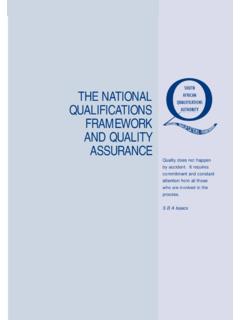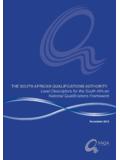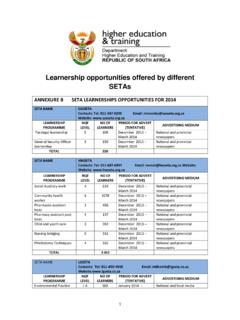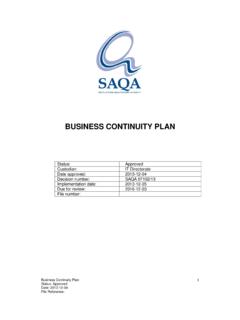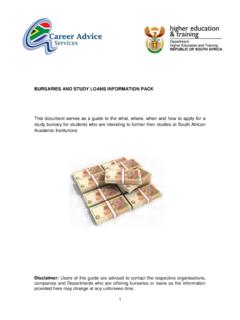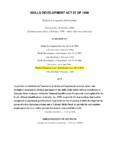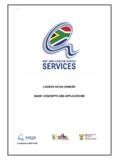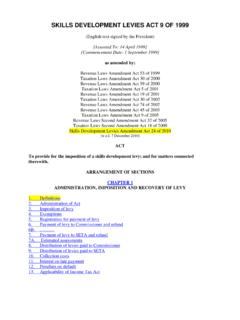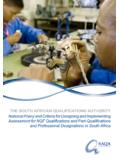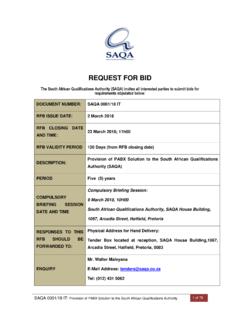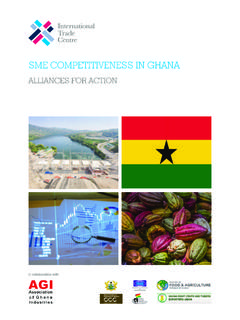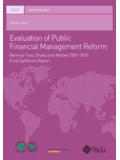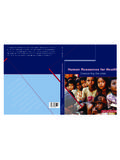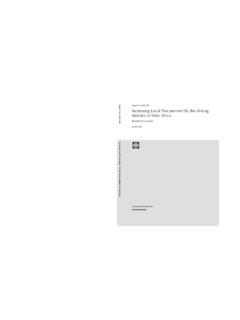Transcription of Verification of Qualifications in Africa
1 Verification of Qualifications in Africa January 2015. This project was funded by SAQA. Conducted by: Linda du Plessis, Neels Vermeulen, Jenny van der Walt, Lebo Maekela North-West University Vaal Triangle Campus Vanderbijlpark 1900. Hendrick van Eck Boulevard Box 1174. Gauteng South Africa Tel: +2716 910 3161. Fax: +2716 910 3176. E-mail: RESEARCH INTO THE Verification OF Qualifications IN Africa . LIST OF ABBREVIATIONS. AHERS African Higher Education and Research Space BNVQF Botswana National Vocational qualification framework BQA Botswana Qualifications Authority CATS Credit Accumulation and Transfer System CHE Commission for Higher Education, CUE Commission for University Education (Kenya). DIVT Directorate of Industrial and Vocational Training EAC East African Community EMIS Education Management Information System ENQF Ethiopian National Qualifications framework IUCEA Inter University Council for East Africa JAMB Joint Admission and Matriculation Board JCC Joint Consultative Committee NCQF National Credit and Qualifications framework NAB National Accreditation Board NABTEB National Business and Technical Examinations Board NBTE National Board for Technical Education NECO National Examinations Council NERDC National Educational Research and Development Council NOE National Organization for Examinations (Ethiopia).
2 NQA Namibia Qualifications Authority NUC National Universities Commission (Nigeria). SAQA South African Qualifications Authority TEC Tertiary Education Council (Botswana). TVET Technical and Vocational Education and Training UNEB Uganda National Examinations Board WAEC West African Examination Council Verification of Qualifications in Africa i TERMINOLOGY. Benchmarking Practices that enable us to make mutually intelligible and useful judgements about the comparative value of Qualifications . Comparability Pegging Qualifications to a Qualifications framework based on a wide range of criteria including purpose, specifications and characteristics of the qualification , high-level learning outcomes in relation to level descriptors, credits and quality assurance arrangements.
3 Certification The formal recognition that a learner has successfully completed a qualification or part- qualification Cross-border University education Cross-border university education is defined as an educational service provided within a national boundary by foreign educational institutions(s) singly or in partnership with local institution(s) through conventional, part time or e-learning modes for the purpose of awarding degrees, diplomas and certificates. Equivalence of Qualifications A process of formally establishing as to whether two or more Qualifications are equal or deemed to be equal or comparable in value. Foreign qualification A qualification offered by an awarding institution that is accredited or recognised in a national system of another country and in accordance with the national policies, or generally accepted practice of that country.
4 Fraud The unlawful and intentional making of a misrepresentation which causes actual prejudice or which is potentially prejudicial to another. Mobile students Internationally, mobile students are defined as students who have crossed an international border and moved to another country (of which they are not citizens) with the objective to study. These students'. countries of origin are usually conceptualised by their country of permanent or usual residence, or their country of prior education the country in which they obtained the educational Qualifications required to enter the programme they are studying abroad (UNESCO 2013). Qualifications system Where a qualification framework exists, it is normally one component of the overall Qualifications system.
5 A. Qualifications system' is broader and includes all activities that result in the recognition of learning, such as the means of developing and operationalizing policy on Qualifications , along with institutional arrangements, quality assurance processes, assessment and awarding processes, etc. Verification Confirmation that a credential is authentic and represents a qualification awarded to an individual by an institution at a specific time. Verification seeks to establish: - Whether the documents in question are genuine, whether they have been issued by the institution indicated in the document; authenticating the status of the institutions and the Qualifications offered by the institution. - The authenticity of qualification documentation and whether they have not subsequently been unlawfully altered by the applicant or others.
6 - Whether the documents in question have in fact been rightfully issued to the applicant. Verification of Qualifications in Africa ii Table of Contents LIST OF ABBREVIATIONS .. i TERMINOLOGY .. ii INTRODUCTION .. 2. RESEARCH 3. RESEARCH METHODOLOGY .. 3. PROCESS OVERVIEW .. 4. RESEARCH FINDINGS .. 6. Environmental Scan .. 6. Qualitative Analysis .. 15. Difficulty in contacting the awarding institution and receiving a response .. 15. Payment for Verification .. 16. Quality of documentation .. 16. Differences in educational systems .. 16. Procedural 16. Involvement of the applicant .. 17. Lack of digitised information .. 17. Language 17. BEST PRACTICES .. 21. RECOMMENDATIONS AND 22. REFERENCES .. 23. Appendix A List of Questions.
7 25. INTRODUCTION. This report has been developed as part of the SAQA process to improve the Verification of foreign Qualifications in an attempt to combat academic fraud. This report aims to provide credential evaluators in Africa with a list of guidelines to assist them in their daily recognition work. Challenges pertaining to the current process with regards to Verification of Qualifications are also highlighted. The production of fraudulent documents, or false degrees and diplomas, has been reported on intermittently, but it is only in the last ten to fifteen years that educational fraud or false Qualifications ' has really become a worldwide problem. There are two principal reasons for this: firstly, academic Qualifications have gained increasing commercial value and are now used to attempt to ensure access to employment, promotion as well as a real bargaining tool for better compensation or greater professional recognition.
8 A. qualification is gradually becoming a prerequisite for an increasing number of occupations and is now indispensable for most positions of power, authority and prestige in modern societies (Hallak & Poisson, 2007; Ineson, 2013). Secondly, modern technology and the rise of the internet have undoubtedly contributed to the wide-spread trend of educational fraud and falsified degrees due to the ease of access to high quality desktop printing systems as well as online degree mills. The Nigerian Minister of Education, Malam Ibrahim Shekarau stated: We can no longer afford to underestimate the need to map out co-ordinated action plan for our institutions to always be on security alert' (Gyamfi, 2014). Internationalisation of higher education demands both intra and inter-regional academic collaboration.
9 Recently, there has been an increasing focus on higher education collaboration within regions. Africa prioritises engaging in internationalisation activities within the region which can be considered as regionalisation of higher education. One of the major problems in the process of internationalisation of higher education in Africa is a lack in instruments to facilitate and promote the international mobility of labour and students. This is further complicated by the diversification of higher education services and delivery systems. There are growing concerns regarding the increase of fraud in the education and training landscape the world over. So serious is the situation that a UNESCO study undertaken in 2003 titled Combating Academic Fraud: Towards a Culture of Integrity' warns that any attempts to improve the functioning of the education sector in order to increase access to quality education for all cannot prove successful if problems of corruption [.]
10 ] are not being properly dealt with' (IAU, 2009, UNESCO, 2003). The study conducted by UNESCO in 2003 highlighted (i) fraudulent Qualifications , (ii) efficiency and turnaround time and (ii) credibility of the process (accurate and trustworthy information) as the biggest risks. Internationalisation and the creation of exchange opportunities for both students and staff are also high on the agenda of most universities. Africa is emerging as an attractive and affordable study destination for international students. This is demonstrated in the rapidly increasing number of international students. Because of international exchange rates, South Africa offers real educational value for money. According to Higher Education South Africa (HESA) statistics, the number of international students increased from in 2004, to in 2012 at South African universities, of which 72% are from Southern Africa and 17% from the rest of Africa .
